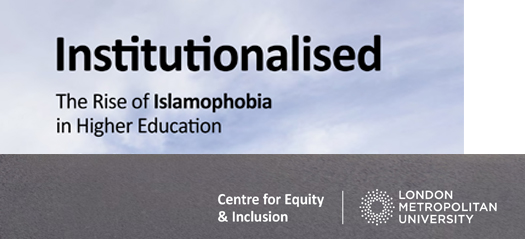
Harun Nasrullah
Universities in the UK are failing to recognise or tackle the growing Islamophobia on their campuses, according to a report released last month by London Metropolitan’s Centre for Equity and Inclusion.
Sofia Akel, Centre for Equity and Inclusion’s Race Equity Lead and author of the report titled Institutionalised: the Rise of Islamophobia in Higher Education said the research examines “the experiences of Muslim students and staff and builds on existing scholarship, which reveals the barriers that Muslims in higher education face, from the point at which they apply to university or/are hired through to degree-awarding, career progression and so on.”
Dr Zainab Khan, Pro-Vice-Chancellor and Director at the Centre for Equity and Inclusion said the report can be “used as a springboard by institutions to begin their own internal discussions and work on Islamophobia.”
Khan mentioned the reluctance of the UK higher education sector in acknowledging the problem of Islamophobia and there was a “considerable distance left to travel” in recognising the complexities of contemporary racism in Britain.
Last November, London Met became the first university to adopt the definition of Islamophobia as developed by the All-Party Parliamentary Group on British Muslims in 2018 following two years of consultation.
The All-Party Parliamentary Group defines Islamophobia as a form of prejudice that is “rooted in racism and is a type of racism that targets expressions of Muslim-ness or perceived Muslim-ness”. The report notes that having the definition as a part of an “institutional vocabulary” would allow universities to begin “to collectively embed anti-oppressive practices.”
More importantly, it creates a useful foundation from which “Muslim students and staff can discuss, lodge complaints and expect to have their experiences understood,” the report said, adding that institutions must move beyond a superficial understanding of Islamophobia that includes its impact on recruitment processes to the psycho-social environment.
The study examined the extent to which Institutional Islamophobia shapes the experiences of Muslim students and staff at London Metropolitan University.
Further sub-questions were then explored through four thematic areas: observing religion on campus; academic success, inclusion and attainment; institutional Islamophobia; microaggressions, safety and reporting Islamophobia.
When it comes to inclusion, 26 per cent of respondents said they would not nominate themselves for student elections or take up leadership positions out of fear of religious discrimination.
The pervasiveness of alcohol at social events also has an exclusionary effect on some students, and 15 per cent felt pressured to alter their religious practices to fit prevailing Western social norms. Anxiety over appearance in relation to religious identity to avoid potential prejudicial treatment was also common.
At an institutional level, Prevent Duty plays into a culture of heightened surveillance and criminalisation of Muslims as a “suspect community”, leading many students to censor their views that could risk being misinterpreted under the lens of counter-extremism.
Twenty-nine per cent of female respondents stated they had to defend their right to wear religious garments like the hijab against those who harbour prejudicial views. As a result of this 15.7 per cent said they felt unsafe wearing religious attire, some of whom were physically or verbally assaulted.
Invisibilising these issues is the fact that there is no tangible outlet available for Muslim students to report or confront discriminatory incidents. Forty-five per cent disclosed that they have no safe space to discuss their experiences in relation to Islamophobia.
This has led to self-preservation strategies, with 16 per cent going as far as to hide their religious beliefs from their peers.
Among staff respondents, the report mentions how a number feel disempowered in terms of career progression optimism due to Islamophobia, leading to a culture of fear where they do not speak up due to concerns of victimisation or reprisal.
Such concerns have also led to instances where staff have attempted to avoid certain topics in their lectures such as religion and politics.